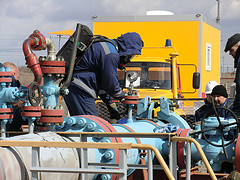A major gas deal between Russia and China could finally be sealed this week when Russian President Vladimir Putin visits China on May 20-21 and meets with President Xi Jinping. In the lead up to Putin’s arrival, the two sides have been working on putting the finishing touches on a 30-year contract for a gas deal a decade in the making, and Russian officials have suggested that the deal will be completed by Putin’s arrival.

38 billion cubic meters (bcm) of natural gas is equivalent to one-quarter of China’s current gas consumption. The contract begins in 2018 and runs through 2048.
To get the gas into China, Russia plans on building a $23 billion pipeline that will span the length of Russia, just north of the Chinese border. It will connect with China at four points – one near where the borders of China, Kazakhstan, Mongolia and Russia meet, and three more connections much further east, including one at Vladivostok.
The negotiations have taken so long mostly because neither side wanted to give in on price. China was looking for similar or better pricing than what Russia gives to Europe, which would be between $10 and $11 per thousand cubic foot (mcf). For years, Russia held out for a higher price, but the crisis in Ukraine has weakened Russia’s hand. Gazprom gets about 80 percent of its revenue from selling gas to Europe, and with Russia’s relationship with its western neighbors deteriorating quickly, Russia needs other markets. That has it looking east.
China has gained even greater leverage over the years from working with Turkmenistan on natural gas supplies. China already receives about half of its natural gas imports from Turkmenistan – 20 bcm – and the two sides agreed last year to triple the volume to 65 bcm by 2020.
So while Russia was waiting for China to cave, the Middle Kingdom was finding alternative suppliers.
Moreover, not only is Russia feeling exposed by its dependence on a European market that could shrink in the coming years, but it is also in a race against the clock to meet rising Asian gas demand. That’s because a lot of liquefied natural gas capacity is set to come online in over the next three to five years; both Australia and the U.S. have ambitious plans to send LNG to Japan, South Korea and China. Russia is in a much better position geographically to meet that demand, but it would need to accelerate building pipeline capacity and liquefaction terminals before Australian and American companies beat them to the punch.
All this is to say that China has capitalized on Russia’s vulnerability, and before the last “i” is dotted on the gas contract, Beijing might have what it wants.
If that happens, it would be a major concession by Russia. As Steve LeVine notes over at Quartz, the $10-$11/mcf price Russia may agree to would be below the $12/mcf that Gazprom needs to merely break even.
For the deal to go through, China might have to pay a large amount upfront instead of over 30 years. Investors continue to pull billions of dollars out of the Russian economy in the response to the crisis in Ukraine, so Moscow could use Beijing’s money.
See Also:
- Russia Looks to China as Relations with Europe Deteriorate
- Russia Building Floating Nuclear Power Plants
- Is Putin Right?
Source: http://oilprice.com/Energy/Energy-General/Russias-Weakened-Hand-Could-Pay-Off-For-Beijing-In-Major-Gas-Deal.html Reprinted by Permission
By Nick Cunningham of Oilprice.com
